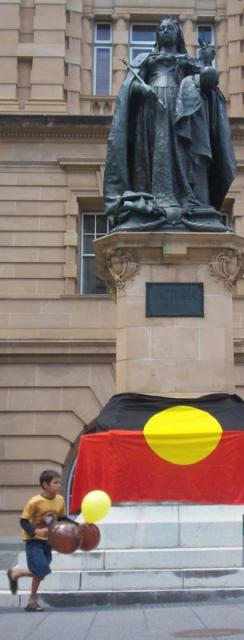Search
Democracy Links
Member's Off-site Blogs
slow journey to justice .....

February 13 marks the two-year anniversary of the Australian government's historic apology to its indigenous population.
Beamed on live television throughout the country, tens of thousands gathered before screens in city squares, community centres and school assembly grounds to watch newly elected Labour Prime Minister Kevin Rudd say sorry. Indigenous Australians, some of whom had travelled for days to watch the apology from the lawns of Parliament House, wept as Rudd apologized, especially for the removal of Aboriginal and Torres Strait Islander children from their families, a policy which continued into the 1970s, resulting in what are now known as the Stolen Generations. Rudd declared the apology to be a turning point for the nation, the beginning of a new chapter in Australian history in which indigenous and non-indigenous Australians would "tackle, together, the great practical challenges that indigenous Australia faces in the future."
"Great practical challenges" is something of an understatement - indigenous Australians have a life expectancy 17 years shorter than non-indigenous Australians; they make up 2 percent of the Australian population, but 25 percent of its prison population, and many live in conditions of abject poverty unthinkable to the non-indigenous majority. While there are indigenous Australians living throughout the country, the Northern Territory is by far the most indigenous region in terms of population, land held under native title and prevalence of culture. While there is no denying the widespread poverty and despair in many parts of the Northern Territory, it is also where the land rights movement began in the 1960s, and where indigenous cultural practices are still at their strongest today.
http://www.truthout.org/sorry-about-intervention57543
meanwhile .....
Holding their breath for Palm justice
ABORIGINAL DEATHS IN CUSTODY, PALM ISLAND RIOTS
Another day, another inquest into the death of Mulrunji Doomadgee -- an Aboriginal man killed in the Palm Island Police Station in 2004, is under way.
The findings of the second inquest (the first was abandoned) were set aside last year after a court found Senior Sergeant Chris Hurley could not have inflicted the fatal injuries simply by punching Mulrunji Doomadgee.
For his part, Hurley has admitted killing Mulrunji, but claims it was a tragic accident.
Mulrunji was found dead on the floor of a cell in the station less than an hour after he was arrested by Hurley on the morning of November 19, 2004 for swearing. He had suffered four broken ribs, bruising to the head, a torn portal vein and his liver had been almost cut in two.
A week later, Aboriginal residents torched the police station, courthouse and Hurley police barracks amid claims of a cover-up, claims that later proved true.
This latest inquest is being watched by Aboriginal people around the nation for one simple reason: it represents the best chance yet for justice over an Aboriginal death in custody.
The Royal Commission into Aboriginal Deaths in Custody looked into the deaths of 99 Aboriginal people. All of them, apparently, did it to themselves, because while there were deep suspicions of occasional foul play, no one was ever charged over a single death.
Hence, Hurley was the first police officer in history to face trial over the death in custody of an Aboriginal man. He has already been acquitted of manslaughter, but Aboriginal people haven't given up hope Hurley will one day pay a price for the death, even if it's only in a civil court.
Thus far, Hurley has escaped sanction, and has even received a promotion to the rank of Acting Inspector.
The inquest has so far heard from Roy Bramwell, an Aboriginal man who was sitting in the Palm Police Station when Mulrunji died.
In past inquests, he claimed his vision of a scuffle between Hurley and Mulrunji was obscured by a filing cabinet, but that he saw Hurley strike Mulrunji about three times, and yell, "Do you want more Mr Doomadgee, do you want more?"
But this week, Bramwell told the court that while his direct view was obscured by a filing cabinet, he watched the assault in a mirror. He told investigators this in his original statement, but it was removed after he was threatened by one of the local detectives investigating the death.
"(The officer) told me 'Hurley is a good man, he's a good friend, anything happens to him and I'm going to come after you'," Bramwell told the court yesterday.
That officer, says Bramwell, was Detective Darren Robinson, who screwed up his original statement and binned it, before threatening him.
Robinson is already in hot water -- during the criminal trial of Lex Wotton, the man ultimately convicted of torching the Palm Police Station and Court House -- it emerged that Robinson had repeatedly lied to superiors during an investigation into another assault by Hurley, this time an Aboriginal woman, six months before Mulrunji was killed.
Robinson was appointed to investigate allegations Hurley -- a known friend of Robinson -- had run over an Aboriginal woman with a police vehicle. Barbara Pilot was airlifted from Palm with her shinbone sticking through her skin.
A doctor who treated Pilot told investigators he felt pressured by police to agree the incident never occurred. Indeed, according to Robinson, it never did.
Twice Robinson submitted false reports to his superiors in Townsville claiming the incident was fictitious. Despite the deceit, six months later his superiors again appointed him to investigate Hurley, this time over the death of Mulrunji.
- By John Richardson at 12 Mar 2010 - 10:47pm
- John Richardson's blog
- Login or register to post comments
Recent comments
49 min 5 sec ago
1 hour 20 min ago
21 hours 7 min ago
23 hours 2 min ago
23 hours 23 min ago
23 hours 59 min ago
1 day 46 min ago
1 day 1 hour ago
1 day 14 hours ago
1 day 23 hours ago